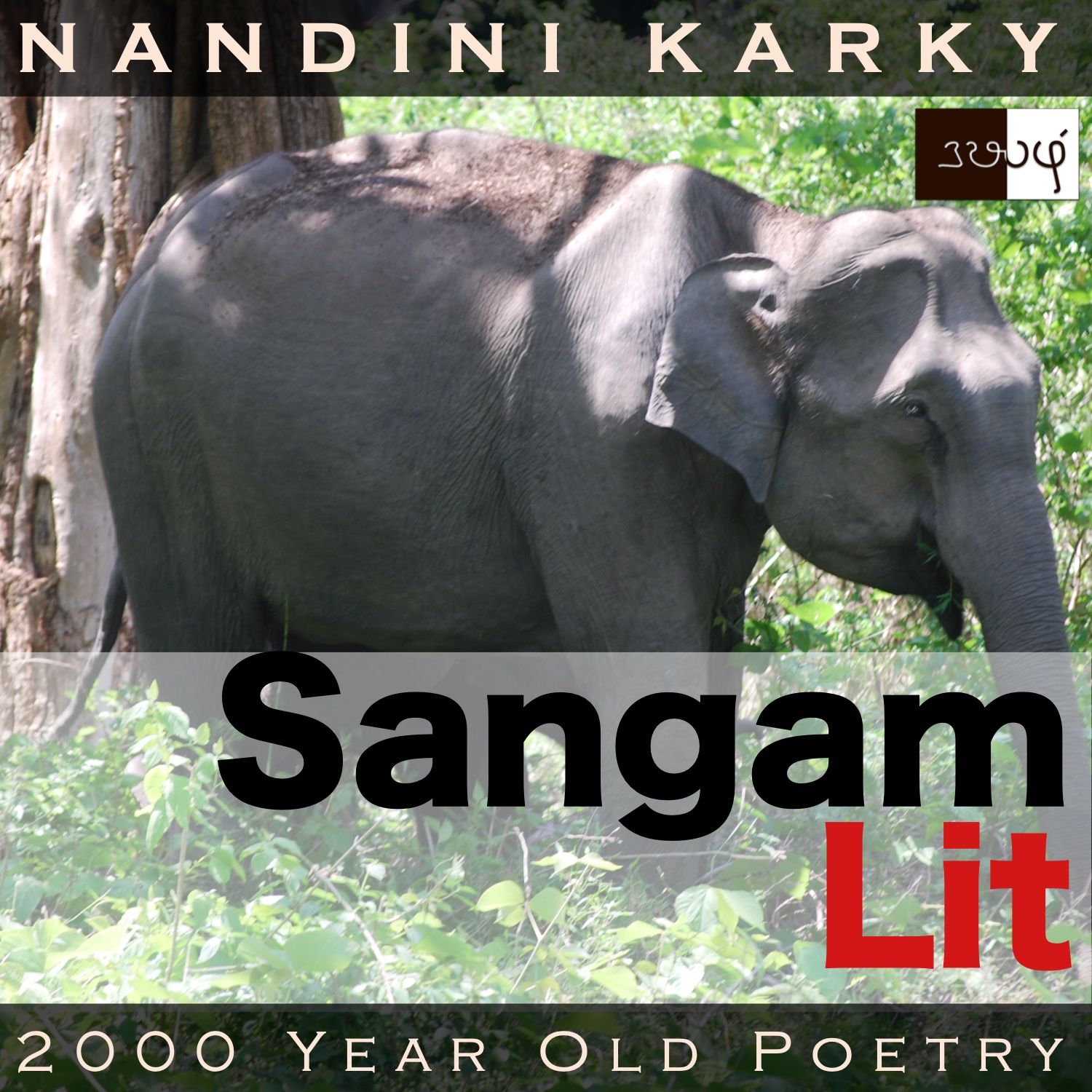Podcast: Play in new window | Download
Subscribe: Apple Podcasts | Spotify | Amazon Music | Android | iHeartRadio | TuneIn | RSS | More

In this episode, we perceive the hidden lessons in nature, as portrayed in Sangam Literary work, Kurunthogai 255, penned by Kaduku Perunthevanaar. Set in the drylands of ‘Paalai’, the verse speaks in the voice of the confidante to the lady, assuring the lady that the man would not return halfway in his mission to gather wealth.
பொத்து இல் காழ அத்த யாஅத்துப்
பொரி அரை முழுமுதல் உருவ குத்தி,
மறம் கெழு தடக் கையின் வாங்கி, உயங்கு நடைச்
சிறு கட் பெரு நிரை உறு பசி தீர்க்கும்
தட மருப்பு யானை கண்டனர்-தோழி!-
தம் கடன் இறீஇயர் எண்ணி, இடம்தொறும்
காமர் பொருட்பிணிப் போகிய
நாம் வெங் காதலர் சென்ற ஆறே.
‘He shan’t turn back from his duty’ is the strong message here. In the opening words ‘பொத்து இல் காழ அத்த யா’ referring to ‘a ya tree with a supple core and without any holes’, we can observe the health of a tree. The phrase ‘மறம் கெழு தடக் கை’ meaning ‘curved hand filled with strength’ implies the powerful trunk of an elephant. The phrase ‘சிறு கட் பெரு நிரை’ meaning ‘small eyed huge herd’ shows how Sangam poets love to play with contrast in their words. In ‘தட மருப்பு யானை’ meaning ‘elephant with curved tusk’, we see the hero of the verse. ‘காமர் பொருட்பிணி’ talks about the ‘affliction of searching for desirable wealth’ and hints at the philosophy that such a search was considered a sort of disease. Ending with the words ‘வெங் காதலர் சென்ற ஆறே’ meaning ‘the path where the worthy lover went’, the verse welcomes us to take a walk within.
What could elephants have to do with the man’s quest for wealth! The context reveals that the man and lady were leading a happy, married life when the man left the lady to go in search of wealth. After a few days, the lady worried that thinking of her state of suffering, the man would return without completing his mission. To the worried lady, the confidante says, “From the ‘ya’ tree growing in the drylands, having a sturdy core and a surface bereft of holes, an elephant with huge, curved tusks forces out cracked barks from the rounded trunk and gathers it in its strong, curved trunk to end the tormenting hunger of its herd with small eyes and sorrowful gait. He saw this very elephant, my friend, in the path, where thinking about fulfilling his duty, having the desire of gathering wealth, the worthwhile lover went!”. With these words, the confidante assures the lady that the man was not one to shirk his duty.
In most Sangam verses, we see how the lady focuses on herself and languishes when the man is away but here is a different situation where the lady worries whether thinking about her would cause the man to not fulfil his mission. Let’s listen closely to the confidante’s words to understand how she goes about reassuring her friend. She starts by focusing her lens on a ‘ya’ tree, and by running through the length of that trunk, shows us how there are no holes on the surface and how the tree seems to be having a rather vital core. Why and to whom could the vitality of the tree be of importance? We learn who when the confidante then points to a huge male elephant, which dashes against this tree’s trunk and gathers the cracked bark in its curving hand. When we decide the elephant is going to have a good meal, instead of eating the bark, it hands it over to the herd of small-eyed elephants standing behind it. And so we understand the elephant has sought out this healthy tree with no infestations so as to satisfy the ravenous hunger of its tribe.
The confidante ends that description of elephants in the drylands by saying the man has seen that elephant in his path, where he had left to search for wealth with the intention of completing his duty. Implying that when the man sees such a scene of the male elephant working to slay the hunger of its herd, the man will remember that he needs to gather wealth not just for his comfortable life but to give to those who will come seeking to him. He has a duty to his people and this elephant in the wild will remind the man of it, the confidante assures the lady. In a subtle manner, the verse shows how even though the search for wealth is a disease, and causes suffering in separated lovers, it’s also a duty to be fulfilled by the man to his society and implies it was the duty of the lady then to support the man in his mission. And, in that, we can find the clarity and determination to do what we have to do, no matter the hardship on the way!




Share your thoughts...